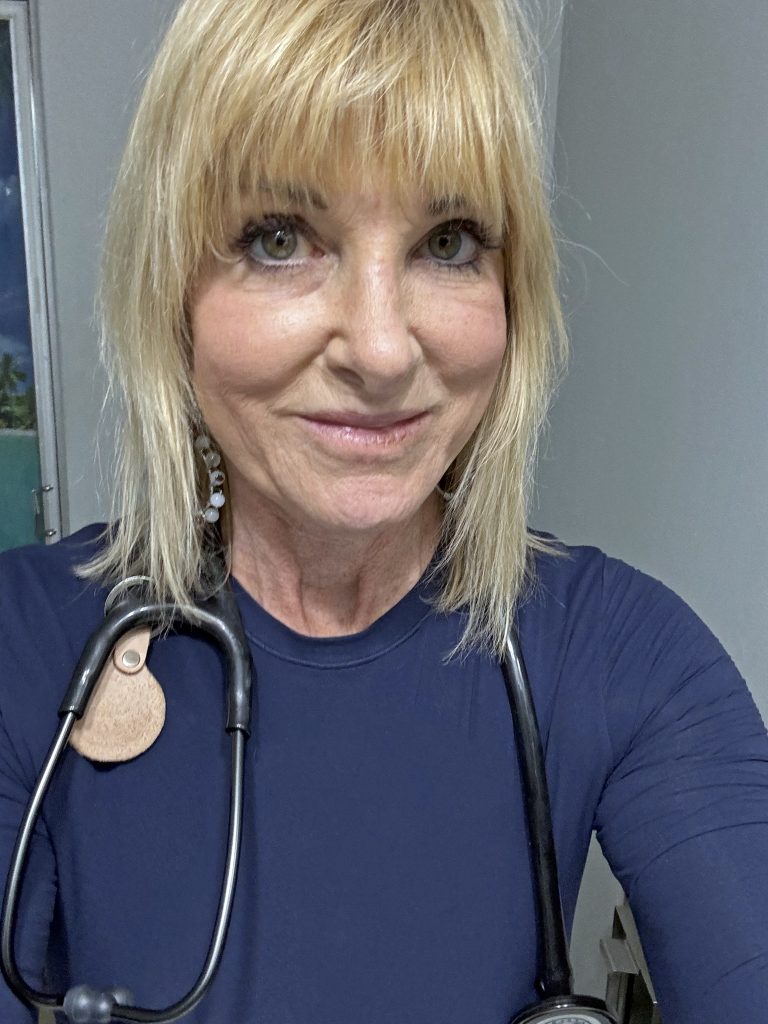
Balancing Service and Science: How Military Experience Shapes Dr. Avishek Kumar’s Approach to Cancer Care
For Avishek Kumar, MD, the journey into cancer care began with a deep family history of healthcare and took shape during his years of military
HIPAA Alert: Potential Data Breach Learn More
Questions on Oncology, Hematology and/or Infusion Clinical Services due to COVID-19 Crisis – CALL 833-698-1623
Important Information for Our Patients Regarding the Coronavirus.
RCCA Providing Area Cancer Patients with Access to Care During Coronavirus Outbreak
RCCA Offering Patients Virtual Visits During Coronavirus Pandemic
If something about your health or body doesn’t seem right, don’t ignore it, but don’t engage in self-diagnosis, either. Rather, see your doctor without delay.
For Elaine Pantellas, those are words to live by – literally.
The Cape May Court House resident says following this straightforward precept saved her life by enabling physicians to promptly identify and treat her ovarian cancer.
Here, she shares her story with Regional Cancer Care Associates, one of the nation’s largest cancer networks with more than 20 locations near you in New Jersey, Connecticut, Massachusetts, and the Washington, D.C., area.
“My only symptom was that my stomach was bloated, which can be caused by so many different conditions,” Ms. Pantellas says. She adds that when she saw her primary care physician to evaluate the bloating, the doctor sent her directly to the local hospital’s emergency department, where physicians drained a significant amount of fluid from her abdomen. After running tests that ruled out other conditions, one of the emergency department’s physicians came to Ms. Pantellas’ bedside and told her she had cancer.

“My family was there, and we all almost fell through the floor,” she explains of that fateful day in August 2023. Ms. Pantellas adds, “I remembered that years before, when you heard that a woman had ovarian cancer, it was as though she had been given a death sentence.”
The retiree explains that the news of her diagnosis was particularly disconcerting because many years earlier she had undergone a hysterectomy and, at the time, her surgeon had recommended removing only one ovary along with the uterus, so that Ms. Pantellas would not experience premature menopause due to the loss of both ovaries. “I kept thinking, I’m 75 now, and I’m facing a cancer that is far worse than going through menopause at age 40 would have been,” she recalls.
Ms. Pantellas was still coming to terms with her diagnosis and its implications when she met the medical oncologist who has provided her with care – and hope – ever since. “My primary care doctor recommended Dr. Julianne W. Childs. I met her briefly in the hospital when I had to stay overnight so that they could drain more fluid, and then I went to see her at her office, Hope Community Cancer Center, here in Marmora. “All I did was cry non-stop and Dr. Childs and her entire staff were completely supportive and comforting. They were very professional in terms of answering all of my questions and discussing my treatment plan and telling me what to expect, but beyond that, you felt like somebody was wrapping their arms around you and like you were the only patient they had, because they’re caring was just so unbelievable,” she says.
After reviewing Ms. Pantellas’ records, examining her, and conducting additional assessments, Dr. Childs worked in consultation with a gynecologic oncologist to formulate a comprehensive treatment plan. Ms. Pantellas went to the hospital each week to drain the fluid – called ascites in medical terminology – that would build up as a result of the cancer cells irritating the lining of her abdominal cavity. In addition, she started a chemotherapy regimen, going to Dr. Childs’ office at RCCA’s Marmora, NJ, location to receive regular infusions via a port inserted through the skin of her chest.

“Dr. Childs and her staff told me beforehand about the good and the bad of chemotherapy and let me know what to expect. I ended up losing all of my hair for a period. They said this would happen, but it was still traumatic. But when that happened, or when other side effects that they had told me about happened, they were always there, being supportive and offering practical suggestions. It wasn’t just Dr. Childs; it was all of the nurses and other people who work with her. I want to name all of them, but I am afraid I’ll forget someone.”
Ms. Pantellas continues, “Beyond being very nurturing to me, they were very kind to my husband, who accompanied me to every doctor’s appointment and every chemo session. “If anybody ever said to me, ‘What kind of care did you receive at this office?,’ the only thing I can say is that five stars is not enough because it was just unbelievable care, and because of that care, I’m doing OK now.”
After several chemotherapy sessions, Ms. Pantellas was able to switch to an oral medication, known as a poly (ADP-ribose) polymerase – or PARP – inhibitor. PARP is a protein that enables cancer cells to survive and grow by repairing functional problems with their DNA. PARP inhibitors prevent the protein from accomplishing those DNA repairs, causing the cancer cells to die. Ovarian cancer patients who have a BRCA gene mutation or another genetic condition called homologous recombination deficiency may be candidates for the PARP inhibitor that Ms. Pantellas is taking, although the Food and Drug Administration (FDA) specifies that such patients should receive the medication only after responding to chemotherapy.
“So now I’m in remission, and they’re even reducing the dose of the medication I take. I wouldn’t say that I’m 100%, but I’m much better. I had lost a tremendous amount of weight, and I’m not a big person to begin with, but I’ve gained back much of the weight now,” Ms. Pantellas says, continuing, “In those moments when you’re by yourself, you’re thinking, ‘Am I really going to be OK?’ but then I think of the support I have received, of the great care I have received, and it gives me cause to be encouraged.” She adds, “Dr. Childs is the only doctor who has ever given me her phone number and said, ‘If you’re not feeling well over the weekend or have questions, call me.’ And she calls you back, not someone on her staff!”
Julianne W. Childs, DO, Ms. Pantellas’ medical oncologist, says, “People facing cancer deserve excellent medical care, but they also need – and deserve – support and a sense of hope that reflects both the reality of their particular medical situation and the incredible advances in treatment that have transformed cancer care in the last decade or so. PARP inhibitors and other targeted therapies that act against specific genetic mutations or cancer processes, immunotherapies, enhanced chemotherapy regimens, protocols for managing chemotherapy side effects, and other innovations enable us to offer patients so much more – in terms of both care and hope – than we could when I began practicing medicine. I am delighted that we can provide patients like Ms. Pantellas effective treatments, expanded options, and greater reason for optimism. I just hope that she and our other patients realize how much they inspire us with their strength and courage.”
While praising Dr. Childs and the other healthcare professionals treating her, Ms. Pantellas stresses that people bear the first – and ultimate – responsibility for their own health. “You have to know your own body, and you have to be proactive. If you’re experiencing something unusual, don’t just say, ‘It will go away.’ There are things that won’t go away and that, if untreated, can become very serious problems. I don’t think I would be standing here right now if I did not go to the doctor when I did. I have a wonderful family and I’ve been totally blessed, and I am so grateful for the care I have received, but I am also grateful that I recognized that something was off and that I gave myself a chance to keep living.”
++++++++++
Dr. Childs is a board-certified medical oncologist and hematologist who has practiced at Hope Community Cancer Center in Cape May Court House and Marmora, NJ, for more than 20 years. After receiving her medical degree from the University of Health Sciences in Kansas City, MO, Dr. Childs completed her internal medicine residency and hematology/oncology fellowship at the University of Medicine and Dentistry of New Jersey. Along with her Hope Community Cancer Center colleagues Kaleem Ahmad, MD; Hemang Dave, MD; and Fatima Fayyaz, MD; Dr. Childs is among 100+ medical oncologists and hematologists who practice with Regional Cancer Care Associates (RCCA), one of the nation’s largest networks of oncology specialists. RCCA has more than 20 locations near you across New Jersey, Connecticut, Massachusetts, and the Washington, D.C., area. RCCA’s cancer specialists see more than 30,000 new patients each year and provide care to more than 265,000 established patients, collaborating closely with those patients’ other physicians. RCCA physicians offer patients innovative therapies, including immunotherapies and targeted therapy, as well as access to approximately 300 clinical trials. In addition to serving patients who have solid tumors, blood-based cancers, and benign blood disorders, RCCA care centers also provide infusion services to people with a number of non-oncologic conditions—including multiple sclerosis, Crohn’s disease, asthma, iron-deficiency anemia, and rheumatoid arthritis—who take intravenously-administered medications.
To learn more about RCCA, call 844-346-7222 or contact RCCA.
The American Cancer Society estimates that 20,890 women across the United States will be diagnosed with ovarian cancer this year.1
Unfortunately, only about 20% of new cases are detected at an early stage,2 when the cancer can be treated most effectively. Experts say that two factors make early diagnosis challenging. First, there is not a highly effective means to screen for ovarian cancer in the way that, for example, colonoscopy can help identify colorectal cancer. Physicians can perform transvaginal ultrasound to evaluate the ovaries when there is a concern, but the imaging cannot determine if an unusual mass is cancerous. Most suspicious masses found on ultrasound prove to be benign when a follow-up biopsy is performed.2 Similarly, oncologists can track changes in blood levels of a protein called CA-125 to monitor how women already diagnosed with ovarian cancer are responding to treatment, but the blood test has not proven useful as a screening measure to identify possible ovarian cancer.2
The second obstacle to early diagnosis is that the symptoms of ovarian cancer are conditions that many women experience from time to time and that most often are due to other, less-serious causes. The most common symptoms of ovarian cancer include:
Other, less-common symptoms include:
While having one or more of those symptoms is not cause for panic, it is a reason to see your primary care physician, gynecologist, or other healthcare provider for evaluation. Prompt attention to one or more of those symptoms is particularly important if you have not experienced them previously, if they are severe, or if they are increasing in frequency or severity.
In addition to seeing your doctor when concerning symptoms occur, having regular check-ups with your primary care provider or gynecologist also is essential for maintaining overall health and enabling early identification and assessment of potential signs of cancer or other serious conditions.
References:
For more information or to schedule an appointment,
call 844-346-7222. You can also schedule an appointment by calling the RCCA location nearest you.

For Avishek Kumar, MD, the journey into cancer care began with a deep family history of healthcare and took shape during his years of military

Physical therapy is well known for its role in helping patients recover from sports injuries, surgeries, and orthopedic conditions. Many people may not realize that

Colon cancer is often treated with surgery, which can have a long recovery period. When patients understand what to expect, they feel more confident about

Regional Cancer Care Associates is one of fewer than 200 medical practices in the country selected to participate in the Oncology Care Model (OCM); a recent Medicare initiative aimed at improving care coordination and access to and quality of care for Medicare beneficiaries undergoing chemotherapy treatment.